 |
 |
| |
|
|
| |
|
|
| |
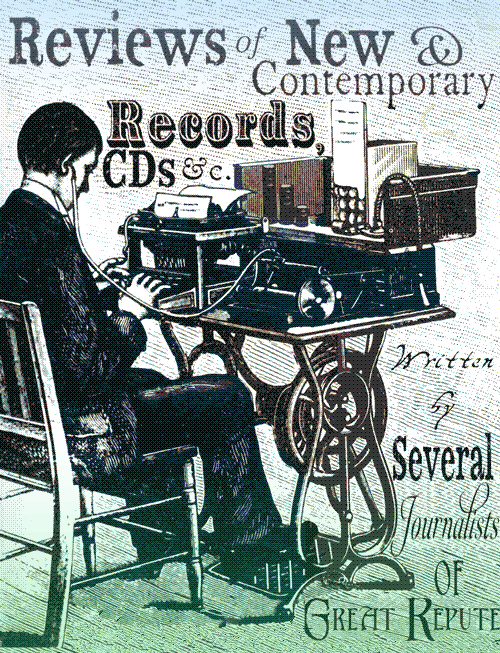 |
|
| =
November 2021 = |
|
|
| Adam
G. Cole |
| Maragda |
| Jack Ellister |
| Black Tempest |
| Regen Graves |
| Empty
House |
| Juju |
| Sula Bassana |
| Talea
Jacta |
| Thought
Bubble |
| Needlepoint |
| Guranfoe |
| Phoenix
Cube / Kitchen Cynics |
| More Experience |
| |
| |
| |
| |
| |
| |
| |
| |
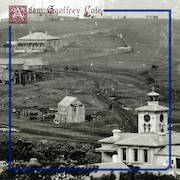 |
ADAM
GEOFFREY COLE – FALLOWING (LP/CD
on Sunstone
Records via www.trappistafterland.bandcamp.com
)
Hot
on the heels of a lovely and illuminating
interview in the latest edition of The
Terrascopaedia it seems more than appropriate to
say a few words about Adam Geoffrey Cole’s first
full length new release since moving on, or
perhaps I should say evolving from, his rather
wonderful Trappist Afterland project. I think
it’s fair to say that Adam has a few fans here
at Terrascope and his set was one of the
undisputed highlights of the Woolf II festival
in that bygone year of plenty known as 2019 at
which I also had the pleasure of many chats with
Adam at all hours of day and night.
‘Fallowing’
opens with ‘Pools of Christ’ which immediately
transports the listener into the world of rich
spiritual imagery and elegant folk song form
that defined Trappist Afterland. Perhaps it also
starts to define a distinct and different thread
that runs through this record of beautiful
simplicity and spacious yet intimate
arrangements that bring Adam and his music into
the room in a chair sat opposite to you on a
dark winter’s night. The record is largely Adam
playing alone but with occasional, perfectly
judged embellishments on harmonium and violin
from long term collaborator Anthony Cornish, for
example on ‘Fabric of Being’ where the chant
like vocal is wrapped in a swirl of subtle yet
dramatic drones and psychedelic colours. Whilst
spirituality continues to be a major feature in
Adam’s lyrics which are sometimes akin to
ancient hymns, ritual incantations and even dark
nursery rhymes , there is a clear shift from
explicit gnostic themes into a more general
questing and questioning spiritual undertone
informing more personal stories.
Adam
is clearly heavily influenced by his heritage
and the use once more of archive photos
depicting Kiama in New South Wales where he grew
up are reflective of the journey that this
record and indeed the previous Trappist
Afterland records are a part of i.e. where
recognising heritage is an essential part of
moving forward in life and in a musical sense
too this record is a skilful blend of
traditional stark and foreboding folk styles
with more modern singer songwriter influences
and acid folk colours. ‘Life Is A Fable’
showcases a more upbeat pastoral feel around
themes of harvest and hope for better days and
is a gorgeous song. There are hints here and
through the record as a whole of lockdown
influenced reflection and re-emergence which
hint at difficult days, hopefully now left
behind and the importance of looking forward to
brighter times. ‘Winter Fallows’ also follows a
harvest or seasonal theme albeit more reflective
and sombre in tone which again drinks from the
well of older folk traditions and leads into
‘The Saddest Man’, an old tune sung in a bar
room sing around style and in Adam’s words is an
ode to the disenfranchised that would be sung
after a few drinks late night in a Dublin pub
with Brendan Behan. Based on my experience of
Dublin pubs I would heartily and happily agree.
This
is a beautiful album of personal faith,
reflections and humanity from one of the very
best exponents of the craft. It’s a wonderful
window into a musical and personal world filled
with ghosts, hopes and fears wrapped up in
simple, often stark yet inventive, melodic, warm
and personal music that is gently hypnotic,
intelligent and ultimately uplifting, rewarding
close and repeated listening. Highly recommended
for when you have time to really listen.
(Francis Comyn)
|
|
|
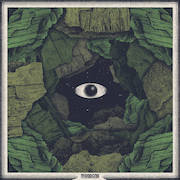
|
MARAGDA - MARAGDA
(LP,
CD,
Digital on Necio
Records,
Spinda
Records
and Nafra
Records)
From
Barcelona,
Spain comes this action-packed rocker of a
debut from Maragda.
The power trio of Guillem (guitar,
synths), Marçal
(bass, synths),
and Xavi (drums) all sing, in English,
usually together as one.
Their style is heavy rock, with a
hint of prog.
I will forgo the contemporary
tendency to call longer songs with more than
one section “prog.”
Maragda plays rock, and they play it
very well, while occasionally adding some of
prog’s aesthetics.
The songs take the listener on a ride
through canyons and valleys, with plenty of
variation, light and shade, full of
pyrotechnics.
Maragda, the album, is a concept
album, which takes place in a
post-apocalyptic world dominated by a
totalitarian regime known as the Core, where
the proud people of ancient Maragda have
been forced underground for generations.
A band of rebels seek to rediscover
Maragda’s secrets, and use them to liberate
the people.
Musically, Maragda comes up aces.
They have a winning combination of
the solid rhythm section of Marçal and Xavi,
and Guillem who’s a highly talented
guitarist. On
one hand, they know how to play thunderously
heavy without being cartoonishly metallic.
And on the other hand, they mix
things up nicely, as in opener “The Core as
the Whole,” combining guitar-driven rock
with some nice Mellotron flute passages.
Maragda plays a very melodic brand of
rock. “The
Calling” features some fine shredding by
Guillem and an anthemic quality throughout.
The
shredding continues in “Hermit” and “Orb of
Delusion.” I
really like Guillem’s guitar tone on the
solos; its high distorted sound has some
hallmarks of the late Eddie Van Halen.
Synths dominate the instrumental
interlude “Crystal Passage,” atop Guillem’s
gentle strumming.
The piece is so melodic and sweet you
just know something explosive this way
comes. And
that comes in right on cue with “Beyond the
Ruins,” which is some outright righteous
rawk, split up into multiple sections.
Remember when bands would sometimes
wrap up concept albums with a long
instrumental finale?
Maragda revives the tradition
excellently on “The Blue Ceiling,” combining
a montage of melodies, tempo changes, flute
and string Mellotron interludes, and of
course Guillem’s magnificent guitar work.
It's perfect.
Maragda’s thirty minutes go by
quickly. They
have found a winning combination of
musicianship, melody and adventurousness,
all chugging away to a hard rock foundation.
You will hear from these guys again,
I’m sure. Grab
a green splatter vinyl edition while you
can.
(Mark
Feingold)
|
|
|
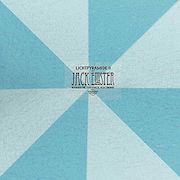 |
JACK
ELLISTER – LICHTPYRAMIDE II (LP/CD
on Tonzonen
Records)
Jack
Ellister has released some very fine psychedelic
song based records on labels such as Fruits de
Mer but in addition has been successfully
diversifying his output for a while now
including the previous volume of Lichtpyramide
which began to explore the more experimental
world of immersive Kosmiche and electronic
sound.
Lichtpyramide
II continues that journey with an album of short
musical experiments recorded at home in South
East London. As with the first volume there is
an emphasis on ‘instant composition’ rather than
crafted songwriting and as such there is an
improvisatory ‘free form’ feel to the flow of
the album which is perhaps more overtly
electronic in nature this time around. It lends
itself to a single listening experience where
you could either take the given track order or
shuffle it to get a different mix but whatever
you do there is much to enjoy in the ambient
world Jack has presented.
The
music is largely a solo effort based on
synthesizers, with guitars, percussion and
effect boxes arranged around a loop station.
Jack is assisted on two tracks by Sula Bassana
and there are occasional moments of spoken word
weaving in and out of the soundscapes like
distant radio broadcasts or lost messages
breaking into the music from the ether.
Musically the obvious touchstones are from early
pioneering electronic and Radiophonic Workshop
soundtracks and German electronic music of the
1970’s with Kraftwerk and Tangerine Dream being
perhaps the most obvious. Slightly distorted
almost orchestral washes of synthesiser combine
with a micro world of minimal mechanical bleeps
and noise bursts which are part industrial and
part Kosmiche. Guitar is sparse and largely
textural but occasional snatches of melody do
actually hint at Jack’s more guitar based song
craft especially on the closing track.
Lichtpyramide
II is a fine listen that is in a sense a form of
low-fi sci-fi for your hi-fi. Like all good
experiments it is inventive, at times fun and
rewarding to listen to. Whether this remains an
entertaining diversion or is a clue to Jack’s
future song based sounds is unclear but if you
enjoyed Lichtpyramide I as I did you’ll greatly
enjoy this second volume and its further steps
into the electronic universe.
(Francis Comyn)
|
|
|
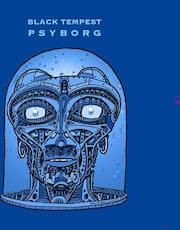 |
BLACK
TEMPEST – PSYBORG (LP
on The
Weird Beard Records)
Stephen
Bradbury has released many a fine electronic
psych record but this is perhaps his first leap
into full throttle space rock territory. Recent
work with Dead Sea Apes and Adam Stone on the
excellent ‘Dataland’ may have provided clues but
this is a definite change in style and feel from
his previous ‘Psyberspace’ release.
It’s
a solo effort which is in essence a ‘science
fiction’ concept record and a tale based on the
opportunities and dangers of AI and human
intelligence – almost like an alternative West
Side Story or indeed Terminator with a happy
love story ending if you will with the use of
analogue equipment representing human
consciousness and digital of course, Artificial
Intelligence.
Things
start with the energetic ‘23rd
Century Space Station’ -
a roaring storm in space with an all
consuming heavy guitar riff barrelling forwards
over electronic percussion, swirls of synth and
a slightly punky detached vocal. Its not unlike
the heavier end of Hawkwind with the guitar much
higher in the mix. ‘Sacred Machinery’ flips to a
more electronic approach where a Popol Vuh style
choral and almost pastoral serenity is blended
to great effect with a gently bubbling
electronic melody driven by synthetic beats.
‘Spaceway Freedom Fighter’ – takes a more overt
Hawkwind direction lyrically and in the
interplay between vocals, guitars and synths and
that’s not a bad thing at all as Stephen
inhabits the…err space.. very comfortably.
‘Android Daydream 1’ is slower and more
stately with gently fizzing, minimal electronic
pulses and Kosmiche waves , followed by the more
urgent ‘Liberation Space Dub’ where hints of
Georgio Moroder beats drive along more of those
Popol Vuh undertones creating an almost
danceable monastic groove. ‘Android Daydream 2’
has more menace and is a darker, more
experimental piece with jarring static sounds
and disjointed vocal and mechanical effects or
perhaps found sounds in a kind of warped
fairground music – more of a nightmare than
daydream. ‘Star Fall’ returns to a rockier
Hawkwind style but with some twists and tweaks
that add an almost jazzy improvisation and at
times Spiritualized type grandeur. ‘Temple Of
The Sun Machine’ completes the journey with a
more reflective and becalmed feel in its use of
repetitive minimal beats, piano and electronic
sound colours and textures.
This
is a fine record which effortlessly glides
between the most energetic reaches of space rock
and inventive electronic music bringing them
together in an entertaining listen. It is I
believe sold out at source but is still
available out in the wild from your favourite
discerning record emporia and I would urge you
to invest. Early copies came with a companion
E.P. ‘Psyborg Augmented’ which is now available
as a download from www.psychlovers.bandcamp.com
with proceeds going to Macmillan Cancer Support
as part of the Psych Against Cancer fundraiser
so you know what to do.
(Francis Comyn)
|
|
|
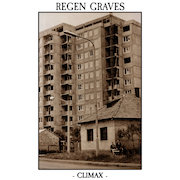 |
REGEN
GRAVES – CLIMAX (CD
on Pariah
Child Records)
‘Climax’
is the fourth full length release from Italian
electronic artist Regen Graves and is inspired
by the work of Hungarian film maker Bela Tarr.
It was recorded before the pandemic in 2019 with
the exception of a bonus track that was recorded
whilst under curfew. Bela Tarr’s films have been
described as depicting social realism and a
pessimistic, desolate and indeed cynical view of
humanity. That darkness and desolation comes
through strongly in the brooding, dark
collection of electronic and indeed cinematic
soundscapes making up this record.
‘Immutable
Reality’
generates static fuelled drones with bursts of
hymnal or horror film organ and snippets of
disembodied voices and sets the tone for a an
album that charts the waters between musique
concrete, industrial and German electronic music
from the 1970’s. ‘The Last Stage of Decline’ has
a dark, almost Tangerine Dream like quality at
times with its sequences of bleeping and pulsing
melody and ‘The Window’ displays more spacey
colours and textures making the desolate a
little less bleak and more mysterious. ‘Diegetic
Distortion’ is a harsher, more industrial piece
with dissonance, distortion and slabs of noise
peppered with machine like clanking. ‘Nothing
Will Be Better’ has slow building waves of
buzzing noise like an oncoming tsunami of bees
throbbing with dynamic energy and strange
occasional fidgety noises. The bonus track
‘Heat’ stands out as being recorded at a
different time and its beat driven waves of
synth remind me of some of the work of Heldon
and Bernard Szajner to name but two.
This
is a dark but not unremittingly bleak record
where its desolate cinematic influences come
through strongly but with some interesting
colours and textures to reward repeat listening.
(Francis Comyn)
|
|
|
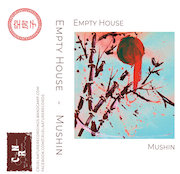 |
EMPTY
HOUSE – MUSHIN (Cassette
on Cruel
Nature Records)
Empty
House is a solo project from Fred Laird of
Earthling Society and Taras Bulba notoriety. As
you might expect from those of us who follow
Fred’s musical excursions it’s bursting with new
ideas from a musical mind that never really
stays in one place for very long and is all the
better for that.
Mushin
is apparently a term in Zen Buddhism for ‘no
mind’ or in this context no set plan which sees
Fred taking this literally with a kitchen sink
full of instruments and no pre conceived ideas
about how to construct, arrange or perform the
music - in other words a chance to see where the
mood would take him. A recipe for a mess in less
skilled hands perhaps but here we are taken on a
journey through eclectic free form soundscapes
that take in many of Fred’s inspirations over 3
days of recording in March of this year. It’s a
recording with a certain raw beauty where
meditative ritualistic ambience encounters an
occasional, sometimes visceral, sometimes
bordering chaotic wall of sound creating some
fascinating juxtapositions.
‘Mushin’
the title track is a lengthy and often
astonishing 27 minutes and is in a sense a
series of connected sound paintings or movements
or perhaps it actually is Fred’s celestial
symphony. It’s an intoxicating blend of
meditative and at times unsettling music. It
starts with insistent temple percussion and
delicate far eastern melodic colours creating a
hypnotic and dreamy haze that slowly snowballs
into a whirlpool of dizzying sound before a
dramatic synth generated wail of lost souls and
distant middle eastern melodic whispers creates
a strange and eerie cosmic interlude that Ligeti
might have considered just a little bit groovy.
This leads into a period of floating and serene
yet ghostly ambience that has a certain blissful
feel but darker edges so that you don’t get too
comfortable. Otherworldly and occasionally
frantic alien machine sounds and the pulsing,
throbbing roar of cosmic noise emerge like an
occasionally chaotic but captivating lost
industrial Kosmiche soundtrack to a forbidden
planet before another brief sea change to a
bouncy far eastern tinged melodic march and then
a further trip to the clouds where slightly
dissonant and distorted celestial melodies,
delicate chimes, and radiating drones return to
a peaceful finish. It’s quite a trip.
The
sound of running water opens ‘Zanshin’ where
primitive beats, delicate minimal percussive
patterns, floating wisps of melodies on the wind
and sparse echo laden guitars create a kind of
Kosmiche surf guitar desert dreamscape before a
huge wind up of dissonant noise returns us to an
almost silent and gentle water drop rhythm. It’s
rare that I think of Midori Takada and Dick Dale
in the same sentence but weirdly and wonderfully
there are touches of both in this superior
ambient environment.
The
third and final piece is ‘The Empty House’ and
it certainly has that creepy claustrophobic B
Movie feeling with its slightly distorted noisy
peaks , swirling organ drone, free jazz noir and
echoing drip drop percussion.
This
is a wonderfully immersive release with an array
of cosmic and hallucinogenic musical wonders to
bring pleasure to your ears and imagination.
It’s a limited run cassette only release at this
time and there may be a handful left as this
goes to print. It would be a shame to miss out.
(Francis Comyn)
|
|
|
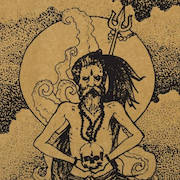 |
JUJU
– LA QUE SABE (LP
on The
Weird Beard Records)
A
JuJu release is always a welcome thing and it’s
a good thing that it appears on a fine platter
of vinyl on
the venerable The Weird Beard label. It’s the
work of the prolific Sicilian
multi-instrumentalist and producer Giolele
Valenti who is also part of a number of other
projects including the occult psych Llay Lamas
and the folktronica collective, Herself.
A
child’s chuckle kicks off opener ‘Not This
Time’, a meaty beaty riff and slightly buried
vocals combine to create a catchy rocker with a
touch of eighties tinted rock sheen. ‘Nothing
Endures’ changes tack and features a moody,
melodic but sometimes angular new wave edge to
the guitars, growling bass and treated vocals.
‘Could You Believe’ takes the new wave feel
further back to raw and minimal basics but then
wraps it in a coat of many colours with upbeat
percussion, melodic New Order synth pop vibes
and dance frills that create a little art
pop/rock gem. A change of direction is in order
for ‘She’s Perfect’ which has a darker, more
claustrophobic feel with heavier guitars and
percussion. ‘Walk The Line’ takes no steer from
Johnny Cash but the big growling bass and
infectious chorus get the toes tapping and
silent singalong going quite nicely. Post punk
pleasures abound on ‘7 Days In The Sun’ through
its off beat melodies, spacious guitars and
floating vocals but there’s a subtle 4AD, early
Creation Records quality to the sound that adds
that extra touch of joy to listening. Finishing
the record we have ‘Beautiful Mother’ with its
swirling desert rhythms and dramatic, almost
chanted vocal encased in a wall of almost
chaotic stirring noise.
This
fine record is a departure from previous JuJu
releases, keeping up a tradition of variety and
change. It captures the best of post punk, new
wave, 80’s psychedelic guitar rock, art pop and
rock and synth pop, mixing influences with
class, intelligence and not a little craft to
create a memorable collection of songs. It mixes
darkness and pop nous where Bela Lugosi dances
and doesn’t care who sees him. It’s a soundtrack
to brighten up any winter’s day and it cheered
me up whilst writing this so what more do you
need to know.
(Francis Comyn)
|
|
|
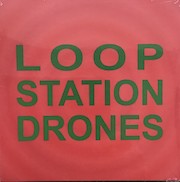 |
SULA
BASSANA – LOOP STATION
DRONES
Limited LP/CD www.sulabassana.bandcamp.com
Electric Moon main man Dave
Schmidt recorded this new solo album over three
evenings during lockdown at home, using guitars,
effects pedals, loopstations, an old analogue
synth, a drumcomputer, an old organ, a newish
Roland SE-02 and a very old Roland SH-5, cut
down and edited, but not so as you would notice.
Things kick off with a near
fifteen minute ‘Roadburn Haze’, recorded
especially for the Roadburn Festival Redux in
April of this year. It’s a slow builder, big
expansive guitars heading out into the
firmament, throbbing and ebbing over a slowly
developing motorik beat. It’s a great start to
an album given ample room to wrap around the
brain before gradually fading away and decaying.
‘Rolling In Outer Space’ is a lot more concise
built on the back of a dirty coruscating synth
pattern, it’s woozy melody sounding like some
far off fairground playing in a distant field
somewhere in space, it even has some NASA
commentary toward the end as we wind down.
A huge slab of space rock
follows this with ‘Die Karawane Der
Unsterblichen’, another lengthy song at almost
fourteen minutes duration. The guitars are more
to the fore etching out a melody whilst a
billowing synth fills in the spaces in between.
‘Wastelandgarden’ takes us back down as it
shuttles around before another huge slab of a
tune emerges from the cosmic debris with the
brain frying ‘Dopeshuttle’, and at almost
eighteen minutes it doesn’t outstay its welcome,
think classic period Hawkwind.
This is followed by another lengthy
outing in ‘Stargate’ a much more sedate tune,
loping through the cosmos. The album ends with
‘One Way’ a delicate song which rounds off the
proceedings very well.
(Andrew
Young)
|
|
|
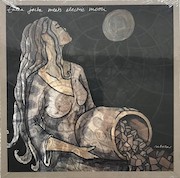 |
TALEA
JACTA meets ELECTRIC MOON
– SABOTAR
Limited LP/CD www.sualtron.com
Electric Moon met Portuguese
band Talea Jacta in September of 2019 in the
club Sabotage which unfortunately did not
survive the pandemic and has shut its doors but
we are left with this album as a memento.
This meeting of two bands
features two drummers and two guitar players
with Electric Moon’s Komet Lulu on bass duties.
Pedro Pestana – guitars and effects. Joao Pais
Filipe – drums and percussive instruments. Komet
Lulu – bass. Pablo Carneval – drums and Sula
Bassana - guitars and effects. A genuine
krautrock, psychedelic experience emerges,
containing just three tracks Sabotar in parts 1,
2 and 3.
This must of been a hell of a
night. Joao is a renowned drummer, who also
makes some of his instruments such as
handcrafted gongs. ‘Part One’ sets the scene
with the drummers eventually locking in together
over heavily treated guitar scapes. It is
interesting to note that there are no keyboards
featured at all, just the sounds of guitars put
through various effects pedals.
The labyrinthine ‘Part Two’
genuinely fries the brain. It takes a while to
get going as it klangs and clatters about,
before it establishes into a dense, heavy piece
of space rock. The final song ‘Part Three’ is
over twenty minutes long, giving the players
plenty of time to gel. It starts off quite
slowly as it drifts about but it isn’t long
before it develops into a huge slab of molten,
space rock, kicking out all the jams. You may
think that with two drummers things might get a
bit messy, but the two of them fly over their
respective kits with a lightness of touch,
Lulu’s bass does a great job gluing it all
together, enabling Dave and Pedro to head off
into the stratosphere, pouring huge slabs of
molten chugging guitar riffs all over the place.
(Andrew
Young)
|
|
|
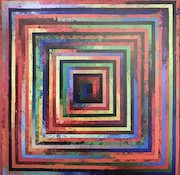 |
THOUGHT
BUBBLE – AROUND
Limited to 250 orange vinyl
LP’s www.bubble.bandcamp.com
Thought Bubble are a new band
comprising of drummer
Nick Raybould and keyboardist Chris
Cordwall with a few guests such as Shaun Bailey
adding additional guitar and Gregg McKella
adding clarinet plus Suzette and Pablo Raybould
contributing vocals. These guys have been in a
few bands such as Glowpeople who may well be
familiar to Terrascope readers.
The introductory track ‘The
Waves’ has spooky synths and alto sax as a
bedrock over which all manner of effects, drums
and guitars weave around, the sax lending it a
mildly middle eastern flavour and is not a
million miles from the kind of music made by
Sendelica. ‘Beatwave’, is terrific, a busy drum
beat with signal injections lays out the beat
and a huge synth melody is introduced, it sounds
great, particularly the synth which is
reminiscent of the synth featured on Adamski’s
‘Killer’. My
favourite track on the album appears next, with
the closed loop of ‘Möbius Trip’, enlivened by
Shaun’s excellent lead guitar fills. ‘An Escher
sketch with Dali’s pen, around it goes and
around again’. The drums are very inventive and
the whole things shuttles back and forth nicely.
‘Rat Race’, as its title
implies is busy and maybe a little bit too busy
for me, the effect being like some overactive
child that has ingested too many E numbers.
Things then calm down somewhat for ‘Fluctuate’,
which bleeps, wows and flutters its way merrily
along, whilst ghostly synths map out a melody,
Gregg’s reedy clarinet adding a jazzy flavour to
the steady drum and synth patterns. The album
ends with ‘Devoider’ a slower synth and drum
tune with glimmering keys and shaun’s electric
guitar used to fine effect. I believe that the
band have also just finished up their second
offering, which judging from this will be well
worth getting.
(Andrew
Young)
|
|
|
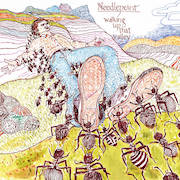 |
NEEDLEPOINT – WALKING UP THAT VALLEY
(LP, CD, Digital on Stickman
Records/BJK
Music)
As leaves fall, the air takes on a
chill, and we start contemplating our plans for
the year’s end, we take a peek back to almost
the start of the year with one of the year’s
highlights, Norwegian prog-jazz band
Needlepoint’s blissful ode to the Canterbury
sound, “Walking Up That Valley.”
The album’s rightly drawn positive
comparisons to Caravan and Soft Machine, among
others. I’ll
throw current progsters Magic Bus and Wobbler in
as well.
Needlepoint is several highly talented
and experienced musicians from Norway’s jazz and
prog scene, and is masterminded by Bjørn
Klakegg, who, in addition to being the primary
songwriter, sings and plays guitar, and adds
violin, flute and cello to the proceedings.
Keyboardist David Wallumrød
brings a veritable prog complete checklist
along, including Hammond, clavinet, Fender
Rhodes, Prophet 5, ARP Odyssey, ARP Solus, Mini
Moog; oh, and a piano, too (but no Mellotron).
Bassist and producer Nikolai Hængsle
(Elephant9), in addition to filling out the
bottom, sings and adds guitar, while drummer
Olaf Olsen and guest percussionist Erik Nylander
complete the rhythm section.
It’s a very busy band, and it shows on
the record.
They may be loaded with instruments and
talent, but the mastery of Needlepoint is their
understated approach.
Klakegg’s vocals are simple and quiet.
Wallumrød,
with all those keyboards, takes a less-is-more
approach. Their
verses and choruses are more jazz than prog;
they’re a bit non-linear, tricky to hitch your
wagon to and follow along.
But virtually every song introduces a
lengthy instrumental break, and that’s where
this band steps out and shows its mettle and its
muscular chops.
While Klakegg and Wallumrød
trace elegant, progtatstic flights of fancy on
guitar and synth solos, the real magic’s
happening in the engine room where Hængsle’s
crunchy
bass playing and Olsen’s frantic drumming whip
up a propulsive drive that keeps everything
humming along. Their
incredible rhythm often outshines the solo
instruments.
On opener, “Rules of a Mad Man,” Klakegg
sings repeatedly, “Can you believe it/So many
people follow the rules of a mad man?”
Uh, yes I can, quite.
“I Offered You the Moon” serves up
another fabulous break like I described above,
with Wallumrød’s
synth squiggling away over the top of his
Hammond, while Olsen cooks up a raucous jungle
beat on drums. “Where
the Ocean Meets the Sky” is, like many of the
songs here, a staid singing travelogue of a
psychedelic voyage, before morphing into a
fantastic instrumental passage that reminded me
of John Barleycorn-era Traffic.
The nearly eleven-minute closing title
track is not only the highlight of the album,
but one of the top tracks of the year.
The journey starts with a very simple,
introductory section with Klakegg describing a
vivid dream. From
there, it expands into a lengthy instrumental
where Needlepoint pulls out all the weapons in
their considerable sonic arsenal.
Always guided by Olsen’s sure drumming
and Hængsle’s
bass,
Needlepoint take us on a prog joyride of synths,
guitars, organ and flute, before Klakegg returns
to sing the conclusion of his vivid fever dream.
The ending is somewhat odd, in that it
sounds like the band was just about to take
flight again for another round – which would’ve
been entirely welcome – but abruptly fades out.
Nevertheless, even if you should decide
to take a pass on parting with your hard-earned
coinage for the album, I urge you to check out
the title track.
The interesting cover design, by Bjørn
Klakegg’s brother Rune, depicts what looks like
a scene from Gulliver’s Travels, but with the
Lilliputians replaced by ants.
Walking Up That Valley is a terrific
listen, and one of this year’s best.
Chances are, there’ll be many passages
that’ll have you calmly thinking, “nice,
nice…Yeah!” As
the immortal Hank Williams once sang, “You’re
just in time…to be too late.” Hopefully
we
weren’t too late in praising Needlepoint for
crafting this fine record instead of, say, a
wall hanging. Go
enjoy.
(Mark
Feingold)
|
|
|
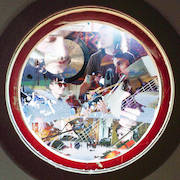
|
GURANFOE – LIVE AT THE BOATHOUSE
STUDIO
(bandcamp)
Here’s
an instrumental album that’s sure to please.
Norwich’s Guranfoe are a four-piece
band that formed in 2012.
They prefer to release live
recordings over studio fare, and there are a
whole bunch of them available.
They finally took the plunge into
studio releases with late 2019’s ‘Sum of
Erda,’ but for this one it’s back to live
performance.
Well, live in the studio.
Their style traverses a lot of
territory, but some stops along the journey
include prog, jazz, and I even detect some
of the more adventurous variety of new age.
The
album
is also available in its entirety as a
youtube video, if you want to pick up the
visual component.
The Boathouse Studio looks like a
comfy workspace on the upper floor, with
occasional views of ships a-sail in the
distance. And
the idea of sailboats in the breeze is a
nice image of what the music conjures in the
mind.
Guranfoe
are
James Burns and Ollie Snell on acoustic and
electric guitars, Robin G. Breeze on bass
and Joe Burns on drums.
For a band often associated with
prog, interestingly there’s no keyboardist.
For this recording, they’re
accompanied by guests Irene Katsenelson on
viola, Malachi Siner-Cheverst on cello, and
Rob Milne on flute and saxophone.
The guests make a huge difference in
adding a lovely pastoral, classical folk
element to the sound.
I’m afraid poor Rob gets the least
amount of screen time, though he contributes
his parts with great distinction.
In
the
three lengthy tracks that make up the album,
opener “Crowned By Estuary” and follow-up
“With the Dumnonii Wayfarer” have similar
beginnings, with lightly strummed acoustic
guitar leading into a gradual build-up.
James Burnes and Ollie Snell swap
guitars between acoustic and electrics on
the two pieces.
From there, the two tracks swell to
full proportion laden with bucolic vistas,
with the viola, cello, and flute or sax
adding more delights.
On “With the Dumnonii Wayfarer,”
Burnes uses a wah-wah pedal, and a little
over halfway through, the tone gradually
shifts from idyllic floating to straight-up
prog. Burnes
plays a stunning solo, and pretty soon we go
around the horn to the other musicians.
“Dumnonii
Wayfarer”
segues without break into the
twelve-and-a-half-minute closer “Etsinta
Harvest in the Thar Sands.”
Led-in by Breeze’s bass and Joe
Burns’ drumming to a waltzing, almost
martial beat, the others join in handily
(and the two guitarists swap acoustic and
electrics once more).
It’s a rousing ensemble performance
where everybody shines together, with
Snell’s guitar and Milne’s sax throwing in a
thrilling duet.
Katsnelson and Siner-Cheverst help
wind things down on viola and cello with a
woozy denouement.
On
“Live
at the Boathouse Studio,” when it comes to
prog, you’ll find no stabbing, stomping
Hammond solos or banks of synths, but you
will find you feel better after listening
than before.
Guranfoe’s music falls into an
in-between area of genres.
Let’s just call it delightful
instrumental music.
(Mark
Feingold)
|
|
|
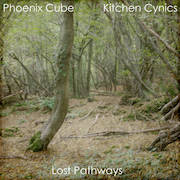
|
THE
PHOENIX
CUBE / KITCHEN CYNICS
- LOST PATHWAYS
(2xCD on Apple Tree
Lament)
This
lovingly crafted double mini CD release
comes in a hand-dyed, hand-stitched fabric
cover with individual card inserts
featuring extracts from old maps. Artwork
throughout is by The Phoenix Cube’s
polymath Simon Lewis. Simon’s own Phoenix
Cube contributes two extended tracks
recorded in the past year at his
Strawberry Minefield studios, ‘Rainy
Season’ and the Phaedra-esque ‘Sleep
Exchange,’ both pieces choc-full of
electronic bleeps, drones, swooshes and
plinks interspersed with snatches of
nature sounds, the overall effect a bit
like experiencing a motorway from the
underside with sudden rushes of noise,
explosions of light and an adrenalin rush
at the climax and if that doesn’t make it
all sound particularly appealing then I
can only suggest you negotiate yourself a
new prescription. Alan Davidson’s Kitchen
Cynics meanwhile slow things down a beat
or two and dive deep inside your head with
two elegant interpretations of traditional
Scottish folk songs, ‘The False Lover Won
Over’ (aka Ewan MacColl & Peggy Seeger’s
False Lover Won Back)
with a gorgeous keyboard intro, and ‘Lady
Margaret and the Gardener’
possibly – although I confess to not
having checked this - based on Proud
Maisri, by Shirley
Collins via Ewan McColl, a ballad which
recounts the dialogue between a gardener
and the lady of the house who deprecates
his flowery propositions. Alan’s rich
Scots brogue is incredibly well suited
to these songs; readers may well have
heard it used to similar effect recently
on ‘Calling of the Quarters’ on Trappist
Afterland’s LP ‘Seaside Tales’, and as
with that album, I have found myself
returning to these discs again and
again.
(Phil McMullen)
|
|
|
 |
MORE
EXPERIENCE – ELECTRIC
LABORATORY OF HIGH SPACE EXPERIENCE
CD
on Old Hippie Records
www.moreexperience.bandcamp.com
I
know nothing of this Polish band so I have done
a bit of digging and it appears that this is
their third album and what an album it is, it is
certainly one of the most overt psychedelic
albums to come along for quite a while. I have
road tested it for quite a while and can
heartily recommend it.
The
band consists of brothers Piotr Dudzikowski
appearing as electric laboratory - guitar,
organs, synthesizers, harmonium, cumbus, tanpura
sitar, field recordings and backing vocals and
Janek Dudzikowski appearing as Force of Jedi-
drums and percussion. Marcin Grabowski appears
as Vizualised String Theory of Bass – basses.
Anna Sobczak-Chona appears as Voice From The
Trap Trip- vocals. Eryk Paluch appears as Maha
Sadu - spoken words and hoomej. Plus Karol
Almert appearing as The Temple Of Oscillators-
synthesizers, sequencers, oscillators, arpeggios
and frequencies.
The
album eases us in with a few serene minutes of
bird song, some gentle electric strummery then
arrives before a mad organ section and out there
lead guitar runs jolt us from our reverie, all
on opener “The Twilight”/”The Dream”, a fine
opening to the album, some ten minutes of
expansive heavy space prog rock sung by Anna,
subtle it is not. This is followed by ‘The
Trip’, a spoken word planetary invocation with
vibes and a superb bass riff, as we reach for
the stars and head off into the firmament and
become a part of space.
“The
Mind”, duly follows “Huge secret gardens with
mighty flowers and all that is inside your
mind”, it’s a bluesy song sung by Anna, with
biting lead guitar, full of great organ and
guitar parts. The drumming is also very
inventive locking in with the super cool bass
playing. The lead guitar on this reminds me of
Steve Hillage’s style of playing. “Beelzebufo”
gives the drummer and bass player a chance to
shine, as they lock into a jazzy groove, this
one percolates and develops into a great space
rocker, oh sorry, that’s still the last song!
Such are the changes of pace within these songs;
it appears that “Beelzebufo” is just an
interlude of space frogs!
We
arrive at “Fairy Tale” another spoken word epic,
a bit more acoustic in nature, keyboard rich and
expansive “Are you sleeping, are you dreaming,
are you tripping”, I think I may be! The title
track follows “Electric Laboratory of High Space
Experience”, it’s a little slower out the traps,
but develops into a pretty huge song, it’s
another slightly bluesy song, sung again by
Anna, but it heads off into its own territory,
with some unashamedly lewd guitar. The album
ends some forty odd minutes after it started
with more birdsong and an insistent cuckoo, as
part of a dawn chorus in “At The Gates Of Dawn”.
This is a terrific album and may well be the
most psychedelic thing I have heard all year.
(Andrew
Young)
|
|
|
|
|
|
|
|
|
|
|
|
 |
|

